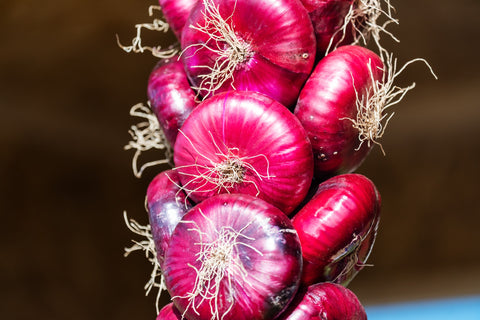
Here in the United States, we have a tradition of watching the ball drop in New York on New Years Eve. Around one million people pack Times Square each year, while millions will watch on television. But when did this tradition start? And why? Let’s explore unique New Year’s Eve traditions across the globe, and later we will explain the roots of the New York ball drop.

Spain begins the new year with the tradition of eating 12 grapes, one grape for each strike of the clock for each hour, and they must be finished before the final strike of the clock. This tradition started late in the 1800s to ward off evil and increase your chances for a prosperous new year. If the last strike of the clock happens before that final grape is eaten, your chances for prosperity will dwindle.

The folks in Denmark throw some old plates at your friends and best neighbors doors to bring them good luck in the coming year. The more broken plates in front of your door, the more luck you will come your way. (I guess plates are inexpensive in Denmark.) It is also a means of leaving any pent-up aggression behind in the prior year.

It is customary in Japan to bring in the new year with a bowl of soba noodles. The noodles long thin shape signifies a long and healthy life. The noodles are firm, meaning strength, but are also easy to bite, symbolizing a clean break from the previous year. (We doubt 'Oodles of Noodles' work in this manner.)

The Greek people have a few traditions. In Greece, hanging onions are a symbol of fertility and rebirth so the onions are hung on their doors to promote growth in the coming year. Another tradition that comes from Greek mythology is the smashing of a pomegranate against the door of their house. (Hopefully, they can get the stain off their front door.) The pomegranate symbolizes abundance and fertility, and the number of pomegranate seeds that end up scattered around the door correlates to the amount of good luck that will come.
As the clock strikes midnight on New Year’s Eve people in Turkey sprinkle salt on their doorsteps. It is believed that sprinkling the salt will bring peace and prosperity throughout the new year. (It also helps to melt the snow on the doorstep.)

Surprisingly, New Years Eve traditions in Ireland do not involve a potato or a pint of Guiness. The Irish will bake a loaf of Christmas bread on December 31st and then bang it against the wall to ward off any evil spirits and chase off any bad luck. As a result of chasing away evil, it helps to bring good spirits and luck, spawning a fresh start to the coming year.

Italy’s tradition is a simple one involving the color red. You see, in Italy, red is associated with fertility. So Italians wear red underwear under their clothes hoping that the red underwear will bring the luck needed to help them conceive. Naturally, only those who want children will participate. The grandparents may wear them in the hope of grandchildren.

In Columbia, South America three potatoes are placed under their beds—one peeled potato, one unpeeled potato, and one partially peeled. At midnight, without looking, they will reach under the bed and grab the first potato they touch (no cheating by feeling the potatoes.) The peeled potato means there will be financial problems in the year ahead. If they grab the unpeeled potato, that signifies prosperity. Half-peeled potatoes indicate neither great prosperity nor financial hardship. (We call the half peeled potato, 'same old, same old'.)

The custom in the Philippines is to serve 12 round fruits on New Year’s Eve, one for each month of the coming year. The colors of the fruits and the round shape all have a particular meaning. The round shape represents coins that will bring good fortune. Green and purple fruits represent prosperity, while yellow fruits symbolize happiness.
In Chile, on New Years Eve, masses are not held at church, instead, services are held in cemeteries. The idea is that people can sit next to the deceased family members and include them in the festivities.

Pack up the car we are heading to the beach. Heading to the beach for New Years Eve is a tradition in Brazil, (although not necessarily in a car!) Individuals wearing white and sometimes will toss white flowers into the water as a symbol of purity. Just after midnight, people jump into the water, jump seven waves, and make seven wishes that they want to come true next year. This tradition pays homage to Yemoja, the goddess of water.

The Scottish have a word for New Years Eve, it is Hogmanay. In Scotland, they observe quite a few traditions, but one, ‘first footing’ is one of the most famous. According to the Scots, the first person who crosses the threshold into your house on New Year’s Day should be a dark-haired male carrying gifts. Why a dark-haired man? It goes back to when the Vikings invaded Scotland. At that time the Vikings, for the most part, all had light hair, and, since they were invading, they likely were carrying an ax. So, a dark-haired man carrying gifts of shortbread, salt, coal, and maybe some whiskey (of course), means good fortune.

Let's get back to the United States. So, we drop the ball in New York on New Year’s Eve. Why? Well, it is not for good fortune, good luck, fertility, or becoming prosperous. The original reason for the ball dropping was a promotion to draw attention to the New York Times' new headquarters. (Hmmm, not nearly as meaningful as other country's traditions.) But, it has become a celebration to share love, joy, and hope for the coming year.

The Fellas wish everyone the Happiest New Year!!

















